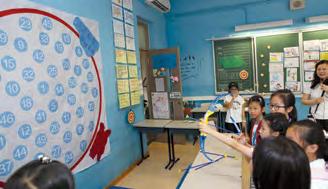
6 minute read
Developing enthusiasm in English
Providing a supportive environment for interaction
We also believe that fun learning activities and games are often effective in motivating learners, especially young ones, to apply the use of a second language. Our department has thus designed a booklet called the English Passport for our students, which provides them with theme-based tasks, supporting materials and organisers for tapping language inputs and exploring ideas on their own. These inputs thus serve as interesting prompts for them to exchange minds and interact verbally with the teachers and English ambassadors on the school campus, offsetting the anxiety often brought by using a second language. The topics for sharing and interaction, revised and updated on a yearly basis, are all closely related to students’ everyday life as well as their perception of the world around them. These face-to-face interactions not only stretch students’ abilities and skills in expressing feelings and thoughts but also develop and expand their vocabulary knowledge. They are also offered the opportunities to apply the language structures and skills learned in the curriculum for a solid foundation. Students who have tried particularly hard in these activities are often awarded gifts for appreciation of their keen efforts.

Interactive activities help build an English school campus Developing enthusiasm in English

It is obvious that learning would only take place when students feel enthusiastic and find meaning for what they are exposed to. Novice students must, in particular, be given enough encouragement and support at the initial stage of learning English. With heightened awareness of the need to make learning experience rewarding and appealing to these freshmen to the school, we have designed two specific learning programmes particularly for them, featuring the English-learning culture of our school.
Creating characters in Primary One English Oral Show
The Primary One English Oral Show, often scheduled towards the end of a school year, has been intended as a precious opportunity for elementary students to develop experience in presenting on stage the different materials they have learned in their English oral lessons during the school year. We believe that providing students with engaging tasks to accomplish can no doubt motivate them actively to apply and consolidate the use of English. With a view to arousing novice learners’ interest in speaking English, the English Oral Show is thus regularly scheduled as part of a compulsory programme in the Primary One curriculum.
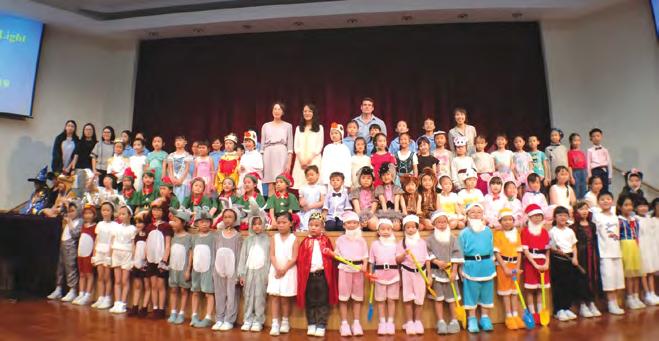

Apart from improving their accuracy and fluency in speaking English, students are given room and autonomy to imagine and create ideas for presenting the characters they act, while reflecting upon message intended in various poems, songs, fun plays and stories. The learning tasks are also intended as learning elements designed for the subject of Project-based Learning.
Can you tell what story or character each of our lovely Primary One students was acting?




Our Primary One students often enjoy sharing with the audience their learning outcomes, making a wellappreciated attempt to perform on the stage while winning over our admiration for their efforts. The themes of the English Oral Show, which range from fairy tales to animal fables in respective years, have been found most exciting and appealing by our students. Each of the Primary One classes presented in groups of various sizes a selection of poems, songs, rhymes, stories or short plays with joy and enthusiasm.
Reading buddies scheme
Under this scheme, groups of well-trained senior students from the Secondary Section pay visits to the Primary One students on Friday mornings, conducting reading-aloud and shared reading activities on the basis of a range of selected poems, prose and stories for half hour before school begins. The classrooms are just filled with laughter, warm exchanges and encouragement. We aim to help build a delightful, non-threatening environment for novice students to interact with the caring school sisters actively in English.
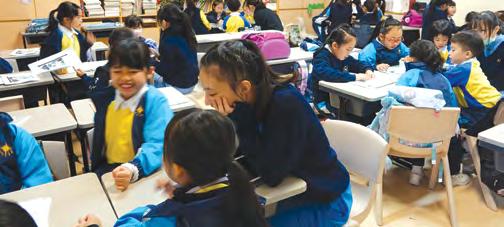



Reading Buddy Scheme
The Secondary Section enlightens our novice learners to the fun of reading
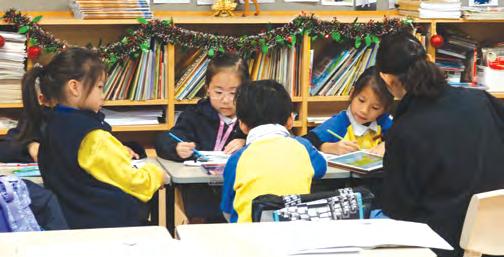
Carnival type of activities for all
A wide range of activities, featured with a mix of enjoyable and engaging language-based activities, are often conducted at recesses and during lunch time through the school year. It is hoped that our students are introduced to pop culture of different types and given the opportunities to interact and mingle with their schoolmates and teachers in English outside classrooms.
Among those activities held, the one on singing-along has always been warmly received. During recesses and lunch breaks, our English ambassadors are eager to help provide schoolmates with the fun-filled occasions to sing songs with their schoolmates. Riddles, board games and treasure hunting games of course also interest our students, driving them to hop around the campus. The Çhat n’ Treat Scheme has also been introduced, aiming to encourage students to interact with schoolmates actively in English on the school campus. Their everyday school-life is well rewarded with prizes, fun and laughter through active participation.
Applying language skills and knowledge developed


Aren’t they eager enough to play our English games?
Fun, prizes and learning - all in one
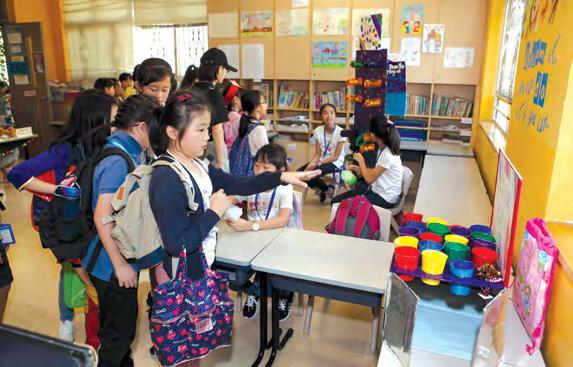



Radio drama - the scene behind
Do join our games on riddles.




Rewards that served them right, cheers! Let’s follow the clues for working out a sensible answer.
To sum up, different corners of the campus are often filled with amusement and enjoyment throughout the year, inviting students to apply the four skills of listening, reading, speaking and writing in the engaging, appealing contexts purposefully constructed.

Educational games designed by English Ambassadors.




Many thanks to the Secondary Section for their service under the scheme

